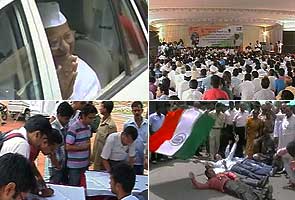Police ordered the release of Anna
Hazare, the country's leading anti-corruption campaigner, from jail on
Tuesday after mounting nationwide protests against his arrest for
planning a hunger strike forced a U-turn by beleaguered Prime Minister
Manmohan Singh.
The arrest of 74-year-old
Hazare early on Tuesday sparked outrage from opposition parties and
spontaneous protests, from candle-light vigils to the burning of
effigies of government figures, in cities across India.
Dressed in his trademark white
shirt, white cap and spectacles in the style of independence leader
Mahatma Gandhi, Hazare has won support from many Indians sick of endemic
corruption in Asia's third largest economy.
A close aide who had also been
arrested told reporters Hazare was refusing to leave the jail until he
obtained government permission to continue his fast in a park in the
capital.
Police also released about 1,500 of Hazare's followers detained in Delhi for defying the police order not to protest.
The turnaround could be a huge
blow for Singh, already criticised as a weak and out-of-touch leader for
the way his ruling Congress party grappled with a string of corruption
scandals and high food inflation.
The decision to release Hazare may also signal a division within the government over how to deal with the popular activist.
STORMING THE BARRICADES
In the capital, supporters
angry at Hazare's detention earlier stormed police barricades, while
thousands more gathered in front of the jail, parliament and India Gate.
"A man has the right to fast.
Gandhi fasted despite everyone telling him not to... Not even the
British (colonial) government prevented him," leading Indian lawyer and
politician Ram Jethmalani told CNN IBN television.
(For live blog click http://blogs.reuters.com/india/2011/08/16/live-blog-anna-hazare-detained/ )
"If the government stops
protests or not, what it can't stop is the anger, which ultimately means
bad news for Congress when people go to the polls," said M.J. Akbar, an
editor at influential news magazine India Today.
"People expect Singh to be strong on corruption, not to be strong on those who protest against corruption."
Initially, Hazare was ordered
held for one week and taken to Tihar jail, joining several government
officials, including the former telecoms minister, who are under arrest
over a multi-billion dollar telecoms graft scandal.
"The second freedom struggle
has started ... This is a fight for change," Hazare said in a
pre-recorded message broadcast on YouTube. "The protests should not
stop. The time has come for no jail in the country to have a free
space."
The arrests shocked many in a
country with strong memories of Gandhi's independence battles against
colonial rule with fasts and non-violent protests.
The question for many is whether
Hazare's movement will grow in the fast-urbanising nation of 1.2
billion people whose increasingly assertive middle class is fed up with
constant bribes, poor services and unaccountable leaders.
An anti-graft protester was
found dead in a blood-soaked car in Bhopal, where hundreds had taken to
the streets. A senior police officer told Reuters it was not clear
whether the death was linked to the protests.
Home Minister Palaniappa
Chidambaram said Hazare and several other leaders had been placed under
"preventative arrest" to ensure they did not carry out a threat to
protest.
"Protest is welcome, but it must be carried out under reasonable conditions," Chidambaram told a news conference.
"A MURDER OF DEMOCRACY"
Both houses of parliament were
adjourned for the day after the opposition protested at the arrests of
Hazare and his key aides, further undermining the chances that reform
bills -- seen as crucial for Asia's third-largest economy -- will be
passed.
"This is murder of democracy by
the government within the House and outside the House," said Arun
Jaitley, a senior leader of the opposition Hindu nationalist Bharatiya
Janata Party.
The scandals, including a
telecoms bribery scam that may have cost the government $39 billion,
have smothered Singh's reform agenda, dented investor confidence and
distracted parliament just as the $1.6 trillion economy is being hit by
inflation and higher interest rates.
Those arrested included Kiran
Bedi, one of India's first female police officers and a widely respected
figure for her anti-graft drive. She was later released.
Police denied Hazare permission
on Monday to fast in a park near a cricket stadium because he had
refused to end his fast in three days and ensure no more than 5,000
people took part.
Opposition figures likened the
crackdown to the 1975 "Emergency" when then-prime minister Indira Gandhi
arrested thousands of opposition members to stay in power.
A HARDENING STANCE
Singh and Congress had hardened their stance against Hazare in recent days, fearing that these protests could spiral.
The prime minister used his
Independence Day speech on Monday to criticise Hazare, and Congress
spokesman Manish Tewari said Hazare was surrounded by "armchair
fascists, overground Maoists, closet anarchists".
Hazare rose to fame for lifting
his village in western state of Maharashtra out of grinding poverty.
His social activism has forced out senior government officials and
helped create a right to information act for citizens.
Hazare became the unlikely
thorn in the side of the Congress-led coalition when he first went on a
hunger strike in April and won concessions from the government.
Tapping into a groundswell of
discontent over corruption scandals in Singh's government, Hazare
lobbied for a parliamentary bill creating a special ombudsman to bring
crooked politicians, bureaucrats and judges to book.
Hazare called off that fast after the government promised to
introduce the bill into parliament. The legislation was presented in
early August, but activists slammed the draft version as toothless,
prompting Hazare to renew his campaign.
Source: Reuters











































